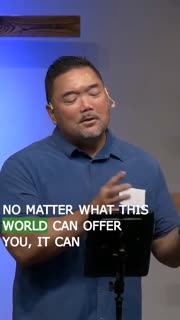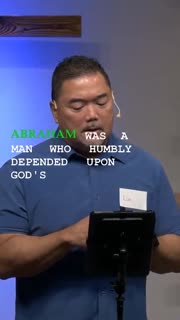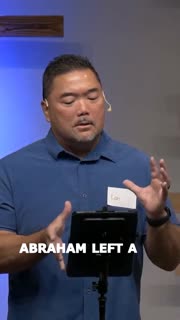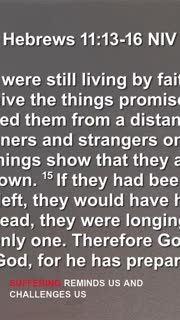Faith, Grief, and Eternal Hope in Christ
Devotional
Sermon Summary
Bible Study Guide
Sermon Clips
### Quotes for Outreach
1. "Unfortunately, people will pass away. 10 out of 10 people, statistics show, will pass away. And this is a given fact. But the challenge is that we can't determine when or how it may happen. And the reality is that there is never a good time to die. And the pain can be unbearable, and it can run deep." [21:18] (22 seconds)
2. "Suffering directs us to an eternally good God who has lovingly prepared his home for us. That we have this eternal hope. That no matter how bad, how painful, how challenging life can be, this world is not our home. We have this eternal home because we have an eternal home that Jesus has prepared for us." [45:37] (18 seconds)
3. "God is sovereign and he is in control of all. From the small, seemingly insignificant transaction of land, God would use it to bless Abraham and his future descendants for his purposes. Through all this, how did Abraham maintain his unwavering faith despite losing his beloved wife?" [42:44] (20 seconds)
4. "Our lives on this earth are temporary. We are called to love God, to love others, but this is not where we plant our roots. We plant our roots in the Lord." [45:37] (14 seconds)
5. "No matter what this world can offer you, it can never replace what God and what Jesus has done for us. Hold on to that hope. Hold on to that faith. Hold on to knowing that Christ gave his life to you, for you, to redeem you, to forgive you, so that you can be in this incredible relationship with him." [49:08] (22 seconds)
### Quotes for Members
1. "Abraham was a man who humbly depended upon God's provision and recognized his place in his role as one who yielded to God's sovereignty. He knew that his identity wasn't grounded in his mature wealth, his power, or even his powerful name. His identity was grounded in who he was, a follower of God, a follower of Yahweh." [30:28] (29 seconds)
2. "Abraham left a legacy of faith in God for his future offspring. How does this connect to us? How our parents, grandparents, uncles, and aunts live their faith in God profoundly influences the generations that follow." [38:10] (18 seconds)
3. "Suffering reminds us and challenges us that our time on this earth is temporary and it's not permanent, and that our eternal home is with Jesus. That's where it resides. Our lives on this earth are temporary. We are called to love God, to love others, but this is not where we plant our roots. We plant our roots in the Lord." [45:37] (28 seconds)
4. "Abraham realized that this was not his permanent home. All the wealth and everything that he was given, it was fine, it was a blessing, but he wasn't going to hold on to that. And yet many of us do because we make this world our permanent home." [32:03] (21 seconds)
5. "Abraham loved God for who he was, not for God's blessings. Abraham loved God for who God is. And so, Abraham loved God for who he was. God's faithfulness, not for the blessings that God produced." [42:44] (8 seconds)
Ask a question about this sermon
1. "Unfortunately, people will pass away. 10 out of 10 people, statistics show, will pass away. And this is a given fact. But the challenge is that we can't determine when or how it may happen. And the reality is that there is never a good time to die. And the pain can be unbearable, and it can run deep." [21:18] (22 seconds)
2. "Suffering directs us to an eternally good God who has lovingly prepared his home for us. That we have this eternal hope. That no matter how bad, how painful, how challenging life can be, this world is not our home. We have this eternal home because we have an eternal home that Jesus has prepared for us." [45:37] (18 seconds)
3. "God is sovereign and he is in control of all. From the small, seemingly insignificant transaction of land, God would use it to bless Abraham and his future descendants for his purposes. Through all this, how did Abraham maintain his unwavering faith despite losing his beloved wife?" [42:44] (20 seconds)
4. "Our lives on this earth are temporary. We are called to love God, to love others, but this is not where we plant our roots. We plant our roots in the Lord." [45:37] (14 seconds)
5. "No matter what this world can offer you, it can never replace what God and what Jesus has done for us. Hold on to that hope. Hold on to that faith. Hold on to knowing that Christ gave his life to you, for you, to redeem you, to forgive you, so that you can be in this incredible relationship with him." [49:08] (22 seconds)
### Quotes for Members
1. "Abraham was a man who humbly depended upon God's provision and recognized his place in his role as one who yielded to God's sovereignty. He knew that his identity wasn't grounded in his mature wealth, his power, or even his powerful name. His identity was grounded in who he was, a follower of God, a follower of Yahweh." [30:28] (29 seconds)
2. "Abraham left a legacy of faith in God for his future offspring. How does this connect to us? How our parents, grandparents, uncles, and aunts live their faith in God profoundly influences the generations that follow." [38:10] (18 seconds)
3. "Suffering reminds us and challenges us that our time on this earth is temporary and it's not permanent, and that our eternal home is with Jesus. That's where it resides. Our lives on this earth are temporary. We are called to love God, to love others, but this is not where we plant our roots. We plant our roots in the Lord." [45:37] (28 seconds)
4. "Abraham realized that this was not his permanent home. All the wealth and everything that he was given, it was fine, it was a blessing, but he wasn't going to hold on to that. And yet many of us do because we make this world our permanent home." [32:03] (21 seconds)
5. "Abraham loved God for who he was, not for God's blessings. Abraham loved God for who God is. And so, Abraham loved God for who he was. God's faithfulness, not for the blessings that God produced." [42:44] (8 seconds)










